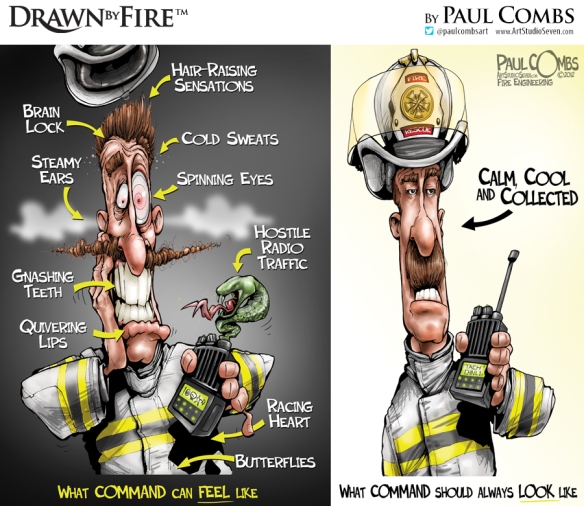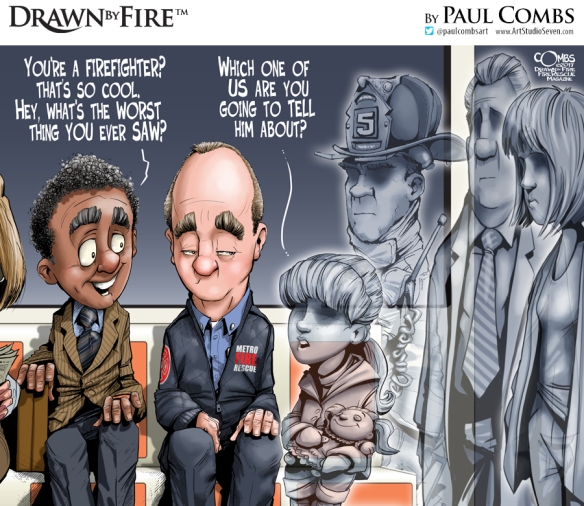NEW FirefighterNation.com and FireRescue Magazine editorial illustration for January: Ghosts
Ghosts – if you’ve been a First Responder for any considerable amount of time, you most likely have them. These are the memories of events and people that stay with us throughout our careers and lives – and they collect over time. This cartoon came to me while sitting in Toronto during a layover when a well-meaning yet curious traveler noticed that I was wearing a fire department jacket and naturally began to ask questions. Then, as it almost always does, came THE question! I politely brushed it off with “yeah, you see some interesting things in this line of work,” but my ghosts were awakened and I traveled with them for the remainder of that week – on the plane, at the hotel… you know the story.
I am for the most part very fortunate. Fortunate because to this point I have very polite ghosts – they’re always with me, but they don’t haunt me. For this, I am grateful. I keep them at ease by accepting and acknowledging them – a practice that seems to work – even with the more disturbing of the group. This has been a winning strategy for me up this point, but I know the game can change in an instant when my ghosts decide to alter the game-plan. I sleep, eat, and function because I found a way to deal and communicate with my ghosts, and it’s something I think most of us have become masters at doing, but it’s rarely discussed. But in the era of mental health awareness I think it’s important to acknowledge not just how we deal with day to day realities, but the realities of what follows us when the day is done – and some cases, a career.
So, I have asked somebody that I respect more than words can convey. A brother, a friend, a mentor, and a man that I aim to emulate in the fire service and in life… a man who has seen his fair share of death and has the ghosts to prove it. Chief Jim Crawford was gracious enough to write this powerful companion article for Fire Rescue, and I am proud to have my work beside his words. So, without any further rambling from me, Chief Crawford, you have the floor.
Ghosts by Chief Jim Crawford
“Which one of us are you going to tell him about?” What a powerful question to ask a firefighter. From the beginning of the fire service firefighters have seen sights that haunt them, and sometimes taunt them, for life. They are images that we as individual firefighters try to forget, ignore or just want to go away, forever. But unfortunately those of us that have been given this ghost image burden will live with these horrible images for the rest of our lives. They are burned into our minds and memories like staring at a bright light then seeing the light pattern when you close your eyes. We will take the images home with us, to our children’s birthday parties, on Saturday date night with our significant other, to job interviews or a get together with friends. We will take them to bed with us at the end of each day tossing and turning as we try to forget, trying to shake the image loose from our minds. Thinking of something else only leads you back to ghosts from another scene, always there, always haunting.
As we see other disasters and tragedy on news channels, we can only think of the new ghosts that our brothers or sisters on scene will have to endure. The brave and valiant attempts at rescue of those we are sworn to protect. And when we have done our utmost best, stretched our oath to the very end, we will have either won or lost, there is no in between. And it’s the losing that destroys each of us from within. The pain, the guilt, the overwhelming sense of failure. It can be too much to bear at times.
My many ghosts have dwelled within me through a very long career. From infants burned into mattresses, to multiple child fatalities, those dragged from burning buildings that didn’t make it, and LODD firefighter fatalities. From the many motor vehicle accidents where the occupants weren’t extricated in time to the victims hit by trains. From working the body recovery team of a major commercial aircraft crash to the victims who jumped before you could throw the ground ladder. I grew up in a fire service when you didn’t ask for help nor show any signs of grief. I have lived with my ghosts without help and have learned how to deal with them in my own way. My family has suffered the most through my self-help psychiatry but that is the way I was taught to deal with the ghosts. I know better now.
Today’s fire service has many avenues to help cope with mental health. From organized Firefighter Assistance Teams (FAST) to employer based Employee Assistance Programs (EAP). We all must seek these avenues of help if life or our job is just too much to take. On the other hand, we also must encourage our co-workers and friends to seek this avenue of help if they are troubled. Keeping these important phone numbers available for yourself or others to share can be very beneficial when a crisis occurs. Local Critical Incident Stress Debriefing (CISD) teams are a very helpful and logical resource when a terrible tragedy occurs within your department or area. Sometimes these teams are capable of handling one on one counseling as well. You need to check into your local CISD or FAST teams to see what their capabilities are and to collect their emergency contact numbers.
Many firefighters try to deal with these memories and images alone. As we often hear, the ones who usually suffer the most are those that are closest to us. Spouses, significant others, our children, family, and close friends all feel our images through our behavior; only they can’t see them like we do. Mood swings, anger, and becoming withdrawn are only a few of the ways that affect us. If we don’t get a grip on these dominos that begin to fall our lives will turn upside down. Many will turn to alcohol and illegal drugs, poor life decisions that will lead to divorce, breakups, termination, or jail.
We often wonder why we subject ourselves to this and if the love of the job is what gets us through. Sadly the suicide rate within the fire service has made a very dramatic increase. The fire service has recently lost some great contributors over the past few years. It’s very clear that the sights, sounds, and smells of our job are affecting many more of us than we know. We must all encourage each other to talk out our ghosts and if that does not work to seek professional help. We must learn to identify the signs of depression as looking out for each other is the most important thing we can do. Simply lending a caring ear may often help those of us through a tough time. We hear the word brotherhood in our business spoken all too often. Those that give freely of themselves to lend a helping hand to those in need without complaint are the true heroes in our business.
Being human is sometimes very difficult. Being human as a firefighter in front of other firefighters is even more difficult. Our tough guy mentality gets in the way of doing the right thing sometimes. We must support and push firefighter mental health to the forefront. Too many firefighters are dying at their own hands. The help and support must start with us first. The more you talk about what is bothering you the easier it is to rationalize what is going on.
I believe that Paul Combs really depicted in this drawing what many of us feel. Reliving calls is something we all do. It can be a healthy release from the stress by using it as a training tool to realize whether our actions were correct or if we need improvement. Learning how to deal with the images we continue to see is the challenge. If you need help figuring out your ghosts please seek assistance now. You are only a phone call away from help.
As firefighters we will continue to answer the call for help. Regardless of the danger we will always be there including the danger to our own mental health. One of my favorite bible verses as it would pertain to the fire service is Isaiah 6:8 which says; Then I heard the voice of the Lord saying, “Whom shall I send, and who will go for us?” Then I said, “Here I am! Send me.”
Firefighters are sent out to the call day in and day out. If your ghosts are troubling you seek out the help you need to continue to answer the call…
James K. Crawford
Assistant Fire Chief
Midway Fire Rescue, SC
Assistant Fire Chief (Retired)
Pittsburgh Bureau of Fire





